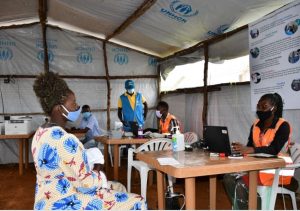Fresh refugee crisis emerging in Uganda
Almost 100,000 refugees from South Sudan and the Democratic Republic of the Congo (DRC) have fled to Uganda so far this year in an emerging fresh humanitarian crisis.
And the number of arrivals is expected to reach 150,000 by the end of this year, according to the UN’s refugee agency UNHCR.
In response, aid agencies and the UN have appealed for $US68 million to support new arrivals as well as the 1.5 million refugees already hosted by Uganda at the start of the year.
 The refugees are fleeing increasing violence in South Sudan and the DRC stretching Uganda’s already large humanitarian response.
The refugees are fleeing increasing violence in South Sudan and the DRC stretching Uganda’s already large humanitarian response.
Kisoro, in southwest Uganda, has received most new arrivals from the DRC. At the Nyakabande transit centre, refugees – overwhelmingly women and children – face substandard and crowded conditions which expose them to risks, including gender-based violence.
At the start of 2022, Uganda was hosting more than 1.5 million refugees, making it one of the most important refugee host countries in the world and the largest in Africa.
Uganda is also a global leader in promoting peaceful co-existence and refugee settlement among host communities.
In the east African, refugees are provided with plots of land for housing and cultivation and they have the same access to health facilities and schooling as Ugandan citizens.
But the UNHCR warns these gains in refugee self-reliance and economic inclusion are now at risk because of severe underfunding for UNHCR’s operations in the country.
By the end of August, UNHCR had received just 38 per cent of its 2022 funding requirement of US$343.4 million to respond to the needs of refugees in Uganda.
The funding gap has hamstrung the capacity to provide critical support, including basic humanitarian assistance, child protection services, civil registration, and livelihood opportunities.
This means refugees are seeing a reduction in support for income-generating activities, including for agricultural inputs that are critical to cultivating allocated land.
Children, especially girls, face a high risk of dropping out of school as there is a lack of money to pay teachers’ salaries, and already crowded classrooms will increase in size.
UNHCR says that with no more funding to procure soap and hygiene kits for women and girls, their health and access to education will be negatively affected.
“UNHCR cannot afford to purchase new stocks of medicines for health centres, while progress in reducing child and maternal mortality will regress, and infant malnutrition will increase,” the agency said in a statement.
“UNHCR and its partners need urgent financial contributions to meet the urgent needs of new refugee arrivals in Uganda, to upgrade the reception capacity and basic infrastructure of refugee settlements and prioritise the relocation of refugees to more suitable facilities,” it said.












